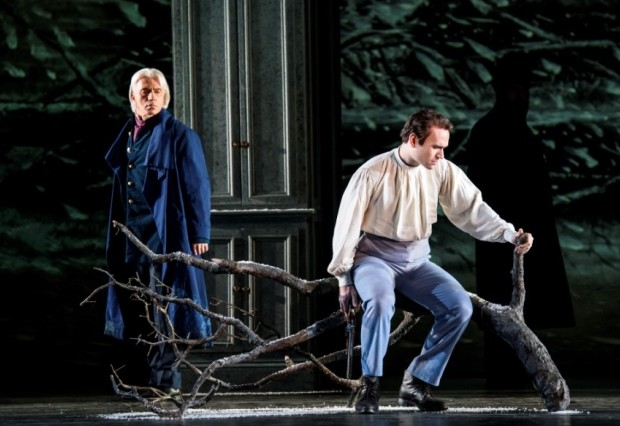Eugene Onegin (Royal Opera House)
Tchaikovsky’s romantic opera in an impeccably cast, brilliantly conducted revival

© Bill Cooper
The irony is that Holten’s own work for the Royal Opera has improved since his first effort, this 2013 Eugene Onegin. The WhatsOnStage Opera Poll-nominated Król Roger was testimony to his talent as an epic director, while L’Ormindo revealed a sure eye for detail and tone. Now here’s a chance to re-evaluate this early disappointment.
Were his detractors mistaken? Sadly not.
Tchaikovsky’s adaptation of Pushkin’s table-turning romance is his most popular opera because, as with the plays of Chekhov, it invites audiences to immerse themselves vicariously in lives being lived. Holten’s interventions, though, lard the opera with memory flashbacks (enacted by youthful doubles) that lend distance where there ought to be immediacy. Take the immortal letter scene: its joy is in watching a naïve young dreamer articulate her nascent desires, but Holten's Tatyana is a mature figure who comments on her silent younger self with Brechtian detachment.
Nor is this memory conceit consistently applied. Where is Onegin Jr during the ball when his wilfulness seals his friend Lensky’s fate? He's absent just when something happens that his older self will never forget. And, later, how can Onegin possibly recall the lead-up to a duel when the person missing on the day was him?
'Unbridled exultation'
Time and again the staging distracts when it ought to absorb, nowhere more so than in the decision to leave the now-dead Lensky motionless downstage for 40 minutes. Try suspending disbelief when you’re worrying about a singer’s pins and needles.
Thankfully, when the singer in question is Michael Fabiano there is little chance of a dead man walking. He’s way too professional for that. The gifted American tenor gives a show-stealing performance in a role that amounts to little more than an argument, a duel and a couple of arias. An heroic masculinity gives his ringing timbre the smack of greatness.
Nicole Car is the silver-toned Tatyana to Dmitri Hvorostovsky‘s silver-fox Onegin. Both sing beautifully, although the Australian soprano will relax more as Tchaikovsky’s heroine in productions that allow her to express her own expansiveness and freedom rather than handing half of it over to a body-double. At present, Car’s Tatyana is neither the slip of a girl whom Onegin disdains early on, nor the proto-Tsarina who dazzles him at the end.
To hear Hvorostovsky sing in his native tongue is always a thrill, and he returns in spectacular voice after his recent illness. Yet unfortunately Holten hobbles him with that silent alter ego, a dancer who’s so carefully bewigged to mimic him that whenever Onegin enters it’s a toss-up whether we get an aria or an arabesque.
In lesser roles there are choice contributions from Diana Montague (Tatyana’s mother), Cathryn Wyn-Rogers (her nurse) and, in luxury casting, Ferruccio Furlanetto (her eventual husband, Prince Gremin). Incidentally, why does Holten have the old boy overhear Tatyana when she rebuffs Onegin? It lays an unwontedly cynical motive on her inherent nobility.
Too little space remains to celebrate the conducting of Semyon Bychkov, but it’s worth the price of admission and then some. You’ll rarely hear the letter scene simmer and boil with greater impact than here, as daring tenutos give way to unbridled exultation. Fabulous.
Eugene Onegin continues in repertoire at the Royal Opera House until 7 January 2016.













